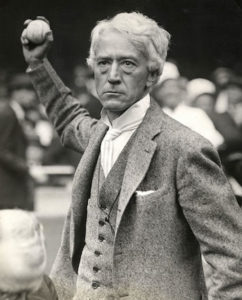
Kenesaw Landis
*Kenesaw Landis was born on this date in 1866. He was a white-American federal judge and the first Commissioner of Baseball.
Kenesaw Mountain Landis was born in Millville, Ohio. His name was a spelling variation on the Battle of Kennesaw Mountain in the American Civil War, where his father was wounded in 1864. Landis spent much of his youth in Indiana; he left school at 15 and worked in a series of positions in that state. His involvement in politics led to a civil service job.
At age 21, Landis applied to become a lawyer; there were no educational or examination requirements for the Indiana bar. Following a year of unprofitable practice, he went to law school. After graduating, he opened an office in Chicago but left it when Walter Q. Gresham, the new United States Secretary of State, named him his secretary in 1893. After Gresham died in 1895, Landis refused an offer of an ambassadorship and returned to Chicago to practice law and marry.
President Theodore Roosevelt appointed Landis as the United States District Court judge for the Northern District of Illinois in 1905. Landis received national attention in 1907 when he fined Standard Oil of Indiana more than $29 million ($800 million in 2020) for violating federal laws forbidding rebates on railroad freight tariffs. Landis was reversed on appeal, but he was seen as a judge determined to rein in big business. During and after World War I, Landis presided over several high-profile trials of draft resisters and others he saw opposing the war effort. He imposed heavy sentences on those convicted; some convictions were reversed on appeal, and others were commuted.
In 1920, Judge Landis was a leading candidate when American League and National League team owners, embarrassed by the Black Sox scandal and other instances of players throwing games, sought someone to rule over baseball. Landis was given full power to act in the sport's best interest and used that power extensively over the next quarter-century. Landis was widely praised for cleaning up the game. His firm actions and iron rule over baseball in the near quarter-century of his commissioner-ship are generally credited with restoring public confidence in the game. Others blame Landis for delaying the racial integration of baseball. Landis was elected to the National Baseball Hall of Fame by a special vote shortly after he died on November 25, 1944.